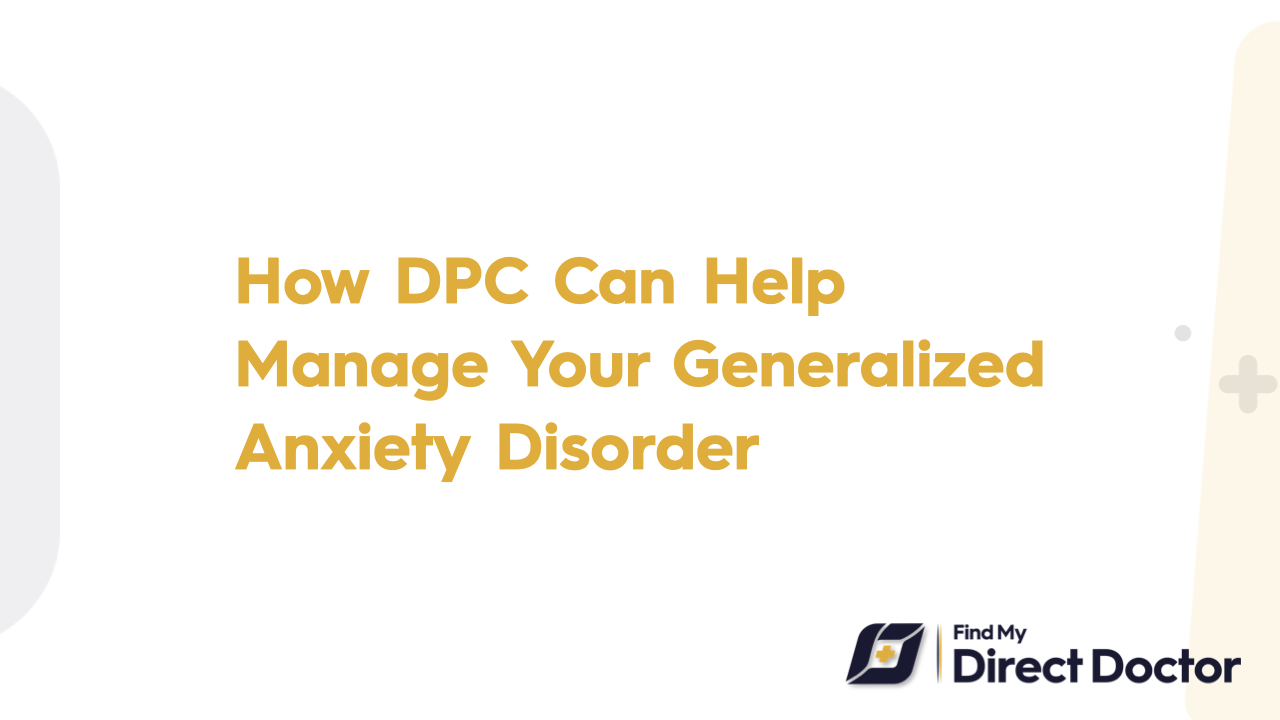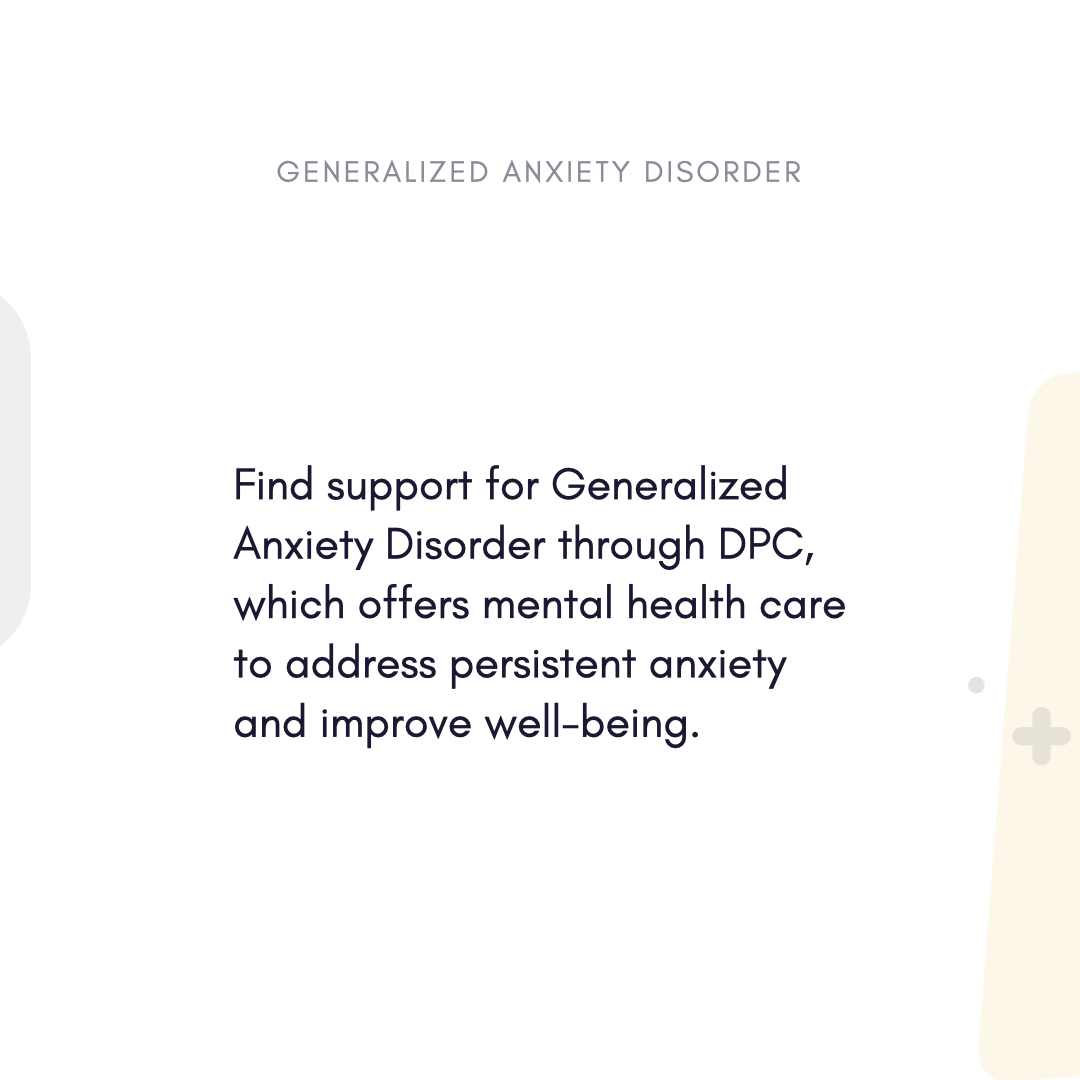Generalized Anxiety Disorder (GAD) and Direct Primary Care (DPC): Your Path to Calm, Personalized Support
Among the 6.8 million Americans living with generalized anxiety disorder (GAD), you may be among those who have struggled with sleepless nights, battled physical symptoms like racing heartbeats and fatigue, or felt paralyzed by persistent worry. Ignored, GAD can sour relationships, ruin careers, and raise depression or substance abuse risk. Direct Primary Care (DPC), however, presents a compassionate, patient-centered method of treating GAD that stresses accessible care, individualized strategies, and long-term resilience, all without insurance restrictions. Let's investigate that.

What Is GAD?
- Six months or more of relentless, uncontrollable worry over daily events define GAD.
- GAD is not transient; rather, it is chronic and usually accompanied by:
- Physical indicators: Muscle tension, tiredness, restlessness, or digestive problems.
- Cognitive symptoms: Irrational fears, overanalysis, and trouble focusing.
- Emotional symptoms: Irritability, anxiety, or feeling "on edge."
- Long-term hazards of untreated GAD:
- Social isolation or strained relationships.
- Long-standing medical conditions including IBS and hypertension.
- Drug abuse as self-medication.
How DPC Changes GAD Care
DPC Shapes GAD Control System
Usually costing USD 50–150, Direct Primary Care (DPC) is a membership-based model whereby patients pay a monthly fee for unlimited access to their primary care physician. This means for GAD sufferers no hurried visits, no surprise bills, and a care plan catered to your specific needs.
DPC transforms GAD care by:
- Individualized Care Anchored in Medical Expertise:
-
- DPC providers spend time learning about your goals, triggers, and past. Emphasizing guidelines from the American Psychiatric Association (APA), they follow:
- Holistic assessments: Rule out underlying disorders (such as thyroid problems) that resemble anxiety.
- Customized Treatment Plans: Combine lifestyle modifications, medication—including SSRIs—and therapy.
- Integration of Mind-Body Practices: Yoga, breathing exercises, or mindfulness.
- Reasonably Priced, Transparent Mental Health Care:
- 2. Some DPC providers offer cognitive behavioral therapy (CBT) or partner with counselors at discounted rates, so helping to lower costs.
- Generic antidepressants or anti-anxiety medications at a pharmacy cost wholesale pricing.
- Avoid ER visits for panic attacks by means of proactive treatment.
- Constant Support for Balance:
- 3. Having 24/7 access to your doctor allows you to change meds during flare-ups—that is, more frequent panic attacks.
- Track changes using symptom logs or mood notebooks.
- Get crisis tools without waiting weeks for a visit.
Key Benefits of DPC for GAD Patients
- Same-Day Visits: Quick help during uncontrollably high anxiety spikes.
- Collaborative Care: Coordinating with therapists, psychiatrists, or nutritionists to create integrated support.
- Cost Savings: Avoiding ER visits and inflated treatment costs helps patients save 30–50%.
Personalized GAD Management in DPC
DPC's approach aligns with APA recommendations for patient-centered mental health treatment:
- Diagnosis and Assessment:
- GAD-7 questionnaire is one validated instrument used in a screen for GAD.
- Differentiate GAD from disorders like ADHD and PTSD.
- Customizing Therapy:
- Lifestyle modifications: Sleep hygiene, cutback on caffeine, or workout schedule.
- Therapeutic approaches: CBT methods taught in-clinic or virtually.
- Medication management: Short-term benzodiazepines (used sparingly), SSRIs, SNRIs.
- Building Resilience:
- Workshops on stress management or mindfulness training.
- Frequent contacts to improve coping mechanisms.
Real-Life Success Stories
- Case 1: Emma, 29, suffered with insomnia and anxiety connected to her job. Her DPC provider linked her with a yoga teacher, taught her CBT techniques, and prescribed low-dose SSRIs. Her panic attacks dropped by 70% in three months.
- Case 2: 45-year-old David turned to alcohol to help with ongoing anxiety. His DPC doctor coordinated with a substance abuse counselor, prescribed supplements, and noted nutrient deficits aggravating his anxiety. For six months he has been sober.
Frequently Asked Questions About DPC and GAD
- Can DPC providers prescribe anxiety medication?
- A: It is true. DPC providers can write prescriptions for and oversee anti-anxiety or antidepressants.
- Is DPC a substitute for therapy?
- A: Not at all. DPC offers continuous medical support and coordinates with counselors to complement treatment.
- How does DPC manage crises?
- A: Same-day visits or telehealth visits to change course and stop ER trips.
- For long-term mental health treatment, is DPC reasonably priced?
- A: Sure. Clear pricing for regular follow-up helps to make continuous treatment possible.
Why DPC Stands Out for GAD Patients
The APA stresses early intervention and ongoing treatment for anxiety—principles embedded in DPC. By removing insurance hurdles, DPC guarantees:
- Timely Adjustments: Quick changes in therapy or medicine during setbacks.
- Holistic Approach: Physical health, diet, and sleep strategies to lower anxiety triggers.
- Empowerment Tools: Resources to help you become resilient and take back control over daily life.
Take Control of Your Anxiety—Now
GAD doesn't have to control your life. DPC helps you find a partner who respects your budget, listens carefully, and enables you to confidently meet challenges. All set to recover your mental clarity? Look for a DPC provider close by and enjoy proactive healthcare with as much compassion.
How DPC Specifically Helps GAD Patients
Rooted in accessibility, continuity, and teamwork, DPC's framework directly addresses GAD's challenges:
- No Wait Times: Immediate crisis relief to stop escalation.
- Integrated Care: Combines lifestyle, therapeutic, and medical approaches under one roof.
- Stigma-Free Support: Build trust with a provider who understands your whole story.






